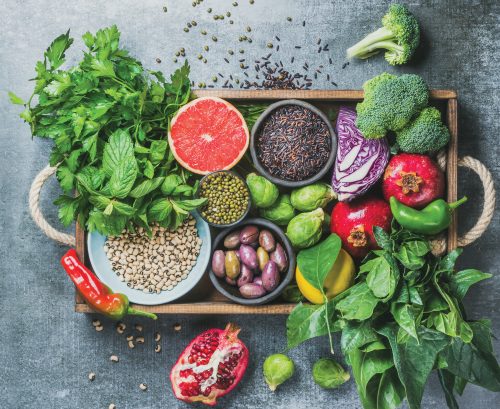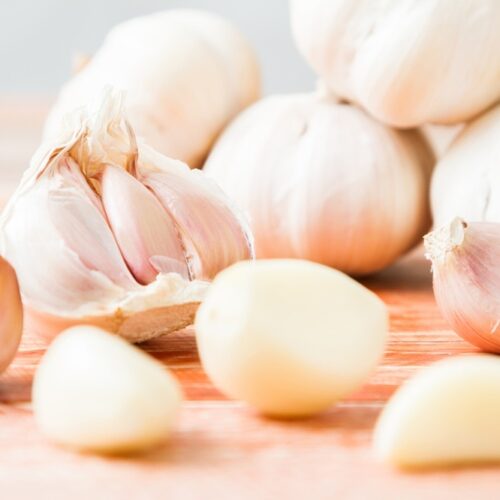
It’s not a myth – the right foods can supercharge your memory, thinking and problem solving. Learn what to eat to upgrade your brain power.
Do you sometimes wish your brain was more like a computer, and you could boost your grey matter with more RAM, speed and processing ability? Although you can’t install a whole new operating system like you would do on a computer, you can upgrade your brain function using the foods you put on your plate.
“Healthy foods are now linked with slowing the ageing process in your brain,” according to Catherine Itsiopoulos, professor and founding head of dietetics and human nutrition at Melbourne’s La Trobe University.
“The right food may enhance brain function and help protect your memory, as well as your ability to think clearly and quickly. In the long term, a healthy diet also appears to [help] protect against conditions like dementia and Alzheimer’s disease,” Professor Itsiopoulos says.
Whether you keep forgetting names or can’t concentrate at work, changing your diet really can help. To help keep your brain in peak condition and firing on all cylinders, try these five key brain-power strategies.
1. Join Club Med
Foods typical in Greece, Italy, France and Spain around 50 years ago, such as ratatouille, paella, fresh seafood, olive oil and nuts, do more than satisfy your taste buds.
“Research suggests the Mediterranean diet increases brain connectivity, promotes better cognition and can also delay normal brain ageing by 10 years, possibly more,” explains Professor Itsiopoulos.
“This appears to be due to its high levels of antioxidant and anti-inflammatory components, such as long-chain omega-3 fatty acids, carotenoids and flavonoids that are found in vegetables and fresh fruit, and polyphenols found in legumes and nuts,” she says.
A traditional Mediterranean diet is mainly about a variety of different vegetables such as tomatoes, capsicum, eggplant, artichokes, carrots, courgettes, peas and spinach, with fish and chicken more than red meat; plenty of monounsaturated oils from nuts, seeds and olive oil; lots of beans and legumes, and small amounts of wholegrain cereals, such as pastas.
These nutritious foods are the likely reason the Mediterranean diet appears to offer some protection against degenerative brain diseases such as dementia.
“A recent systematic review of 11 studies worldwide showed that when people closely follow a Mediterranean-style diet they have a 50 per cent reduced risk of developing Alzheimer’s,” Professor Itsiopoulos says. “In another study of 7500 middle-aged people, those on Mediterranean diets had improved memory scores.”
2. Enjoy eating healthy carbs
The brain relies on a supply of blood glucose, according to Eat to Cheat Ageing and Eat to Cheat Dementia author and dietitian Ngaire Hobbins.
Whole grains, brown rice, pasta, rye, starchy veges, bread and fruit fuel the brain with a steady supply of glucose, as they process slowly. For the many people with pre-diabetes, or undiagnosed or poorly controlled diabetes, whole grains are even more important, helping them avoid highs and lows in blood glucose.
Low blood glucose challenges your ability to think because the fuel supply to the brain is reduced. “High blood sugars can upset the fine balance of a number of important systems in the brain,” Ms Hobbins explains. “The results have been linked to dementia.”
Whole grains and brown rice also calm brain chemistry, boosting clearer thinking and triggering the release of an amino acid called tryptophan which helps you produce ‘happiness hormone’ serotonin.
3. Eat more brain-boosting nutrients
The right nutrients can protect your grey matter from premature ageing. They also help your brain make neurotransmitters, which allow communication between brain cells, improving memory and thought processing. These nutrients include:
Omega-3 fats: These fats include fatty acids called DHA and EPA, which are found in high concentrations in the brain and have vital roles in cognitive functions. Oily fish is the best source of these omega-3s.
B vitamins such as B1, B3, B6 and B12 are found in foods such as fortified breakfast cereals, whole grains, nuts and meats – and they’re pivotal to brain function. They also help to reduce levels of an amino acid called homocysteine, which can compromise cognition.
Minerals that are important for brain function include iodine (from seaweed and seafood), iron (red meat), zinc (oysters and red meat), magnesium (soy beans, nuts and seeds) and also selenium (Brazil nuts and fish). These key minerals help in everything from the repair and maintenance of brain cells, to better oxygen uptake in the brain.
Antioxidants: These nutrients protect cells and promote efficient blood flow through the brain. People with low levels of antioxidants (such as vitamins A, C and E), may have poorer memory and lower cognitive abilities. Many intensely coloured foods are well-known sources of antioxidants. Choose coloured fruit and vegetables such as berries, red apples, dark leafy greens, multicoloured lettuce as well as egg yolks, green herbs, black olives, black and green tea, turmeric, dark chocolate and red wine.
4. Think like the Japanese
People from the island of Okinawa off Japan remain lean all their lives. They also experience low rates of heart disease, dementia and cancers of the colon, breast, ovaries and prostate. Their food mantra? “Hara hachi bu”, which roughly translated means, “Eat until you are only 80 per cent full”.
The Okinawa diet reminds us that it is eating patterns, not individual foods, that create a healthy diet, says Alan Barclay, science and regulatory affairs consultant at the Glycemic Index Foundation.
“Their low-fat diet contains plenty of plant foods and healthy sources of protein, such as fish, as well as carbohydrates, including rice,” Dr Barclay says.
To benefit from the Okinawan approach, use a smaller plate to serve smaller portions. Be aware of how you feel while eating, and when you feel pleasantly full, stop eating, regardless of what’s left on your plate. Your waistline will benefit too. This is a win-win for your grey matter as well as your figure – because a healthier weight has been linked with lower incidence of conditions such as dementia.
5. Stay hydrated
“Your brain cannot fire on all cylinders when you are even a little bit dehydrated,” Ms Hobbins says. “Without adequate hydration, brain neurons just can’t communicate with each other, which after all is what cognition is all about.
“Dehydration also affects blood flow through the brain, which results in a release of stress hormones that also affect production of neurotransmitters.”
How much fluid do you need? Most people should aim for six to eight glasses or cups of liquid each day. But it doesn’t all have to come from water. “You get the fluid you need from many different sources,” she says. “That includes all sorts of drinks – including tea, coffee, juices and milk – and many different foods such as fruits, soups, desserts, jellies and casseroles.
For most people, a drink with each meal as well as something in between should give you enough fluids.”
10 ways to boost your brain
Want to improve your concentration, memory and thinking throughout your life? Follow these tips:
- Eat veges with lunch and dinner, and include legumes twice a week
- Enjoy fresh fruit every day. Have a handful of fresh or frozen berries as a snack
- Eat oily fish twice a week. Good options include fresh or canned salmon, canned sardines and fresh tuna
- Serve smaller portions of meat (beef, lamb, pork and chicken) and less often — two to three times a week
- Choose wholegrain breads and cereals. Low glycaemic index carbs provide your brain with fuel for thinking
- Enjoy dairy foods in moderation. Eating 200g of yoghurt every day helps provide good gut bacteria. Keep your servings of cheese small (about 30–40g per day)
- Use extra virgin olive oil
- Snack on nuts. Walnuts are especially rich in brain-healthy omega-3 fats
- Drink plenty of water. Dehydration affects your thinking and concentration
- Eat until you’re about 80 per cent full. Listen to your body’s hunger cues to stop yourself from eating too much.
What is the MIND diet?
This brain-friendly style of eating is a hybrid of the Mediterranean diet and the DASH (Dietary Approaches to Stop Hypertension) diet.
“Research that involved 923 elderly people showed that 4.5 years later, those who followed a MIND diet had a 53 per cent lower risk of developing Alzheimer’s disease,” Professor Itsiopoulos says.
The main principles of the MIND diet are:
- Eat more of these ‘brain-healthy’ foods: Green leafy vegetables, other veges, nuts, berries, beans, whole grains, fish, poultry and olive oil
- Cut back on these foods: Fried or fast food, butter and margarine, cheese, pastries and sweets and red or processed meats.
Article sources and references
- Chloerton B et al. 2016. Type 2 diabetes, cognition, and dementia in older adults: Toward a precision health approach. Diabetes Spectrum. 29:210-19https://www.ncbi.nlm.nih.gov/pmc/articles/PMC5111529/
- Gomez-Pinilla F. 2008. Brain foods: the effects of nutrients on brain function. Nature Reviews Neuroscience 9: 568-78https://www.ncbi.nlm.nih.gov/pubmed/18568016
- Martinez-Lapiscina et al. 2013. Mediterranean diet improves cognition: the PREDIMED-NAVARRA randomised trial. Journal of Neurology, Neurosurgery and Psychiatry. 84:1318-25https://www.ncbi.nlm.nih.gov/pubmed/23670794
- Miller MG & Shukitt-Hale B. 2012. Berry fruit enhances beneficial signalling in the brain. Journal of Agriculture and Food Chemistry 60: 5709-15https://www.ncbi.nlm.nih.gov/pubmed/22264107
- Morris et al. 2015. MIND diet associated with reduced incidence of Alzheimer’s disease. Alzheimer’s & Dementia. 11:1007-14https://www.ncbi.nlm.nih.gov/pubmed/25681666
- Opie et al. 2013. Adherence to a Mediterranean-style diet can slow the rate of cognitive decline and decrease the risk of dementia: a systematic review. Nutrition & Dietetics 70: 206-17https://onlinelibrary.wiley.com/doi/abs/10.1111/1747-0080.12016
- Shabbir F et al. 2013. Effect of diet on serotonergic neurotransmission in depression. Neurochemistry International 62:324-9https://www.ncbi.nlm.nih.gov/pubmed/23306210
www.healthyfood.com











